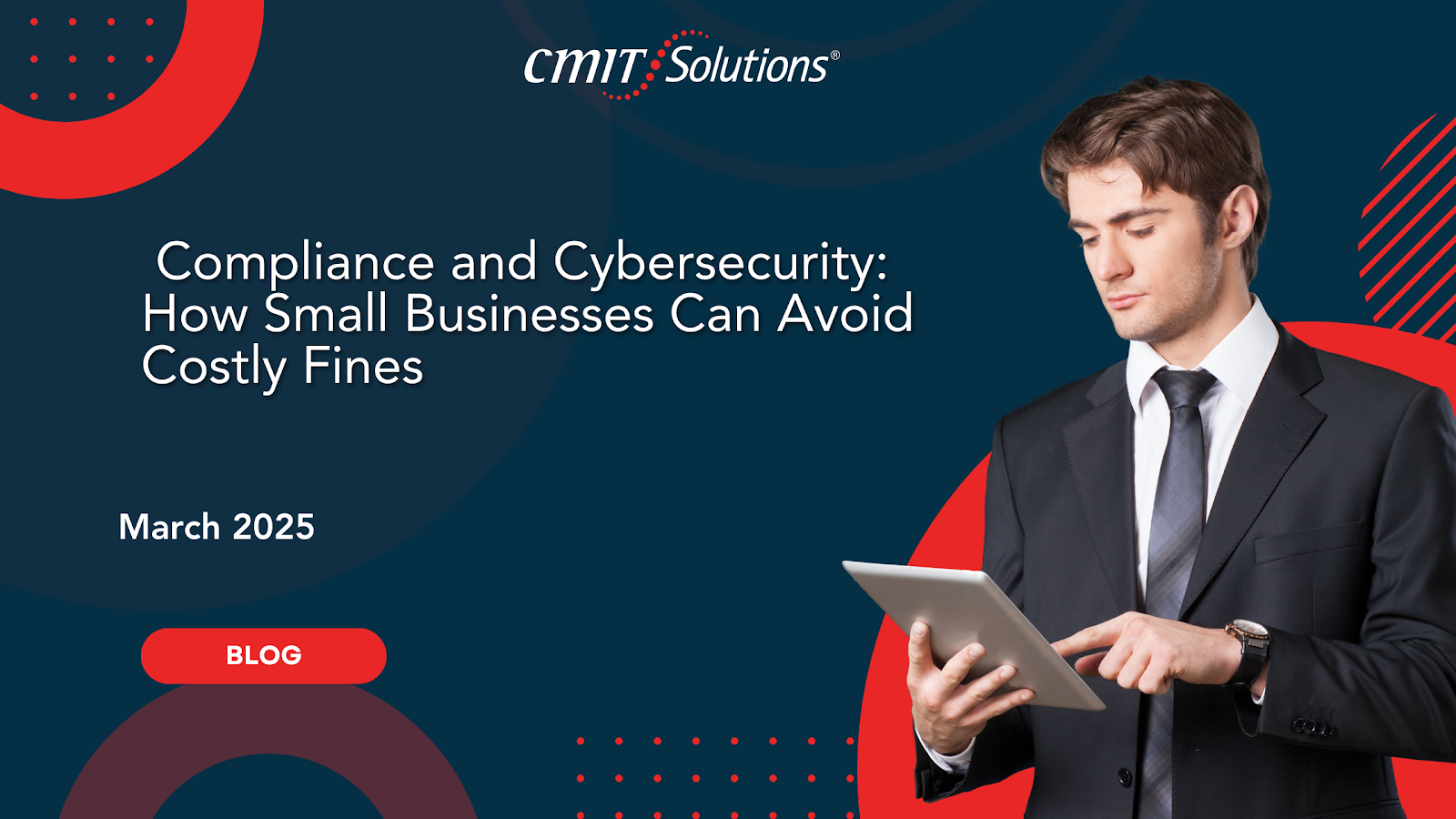Why Compliance and Cybersecurity Matter for Small Businesses
In today’s digital landscape, small businesses must adhere to strict cybersecurity regulations to protect customer data, financial information, and proprietary business assets. Failing to comply with industry standards not only increases cybersecurity risks but can also lead to hefty fines, legal action, and reputational damage.
Cybercriminals frequently target small businesses because they often lack the security infrastructure of larger corporations. Regulatory bodies require businesses to implement cybersecurity best practices to safeguard sensitive data, reduce fraud, and prevent financial losses. However, many small businesses do not fully understand compliance requirements, leading to costly violations.
This article explores:
- The most common cybersecurity regulations small businesses must follow.
- The risks of non-compliance and potential penalties.
- How Managed IT Services help small businesses stay compliant and secure.
The Biggest Compliance Challenges for Small Businesses
Many small business owners believe that compliance regulations only apply to large enterprises. However, every business that collects, processes, or stores customer data must adhere to cybersecurity laws—regardless of size or industry.
Failure to comply can lead to:
✔ Financial penalties and fines from regulatory agencies.
✔ Data breaches that expose customer information.
✔ Lawsuits and legal action from affected clients.
✔ Loss of customer trust and business reputation.
Let’s take a closer look at some of the most important cybersecurity regulations that impact small businesses.
Key Cybersecurity Regulations Small Businesses Must Follow
1. General Data Protection Regulation (GDPR)
📌 Who It Affects: Businesses that collect or process personal data of European Union (EU) residents.
✔ Requires businesses to obtain explicit consent before collecting user data.
✔ Mandates strong data encryption and secure storage of personal information.
✔ Gives users the right to request data deletion (Right to Be Forgotten).
✔ Imposes fines of up to €20 million or 4% of annual revenue for violations.
🔹 Example: A small online retailer selling products to EU customers must ensure all customer data is encrypted and stored securely, or face GDPR fines.
2. Health Insurance Portability and Accountability Act (HIPAA)
📌 Who It Affects: Businesses handling protected health information (PHI), including medical practices, insurance agencies, and healthcare providers.
✔ Requires secure storage, transmission, and access controls for patient records.
✔ Enforces strong cybersecurity measures to prevent unauthorized access to PHI.
✔ Non-compliance can result in fines ranging from $100,000 to $1.5 million per violation.
🔹 Example: A small dental office must ensure that patient records are encrypted and backed up securely to comply with HIPAA guidelines.
- Payment Card Industry Data Security Standard (PCI-DSS)
📌 Who It Affects: Businesses that process, store, or transmit credit card payments.
✔ Requires businesses to use secure payment gateways and encrypt financial transactions.
✔ Mandates multi-factor authentication (MFA) for customer payment verification.
✔ Violations can lead to fines of up to $500,000 per security breach and loss of credit card processing privileges.
🔹 Example: A small e-commerce store must use PCI-compliant payment processing services to protect customer financial data.
4. California Consumer Privacy Act (CCPA)
📌 Who It Affects: Businesses that collect personal data from California residents.
✔ Requires businesses to disclose data collection practices and allow users to opt out.
✔ Mandates strong security measures to prevent data leaks.
✔ Violators face fines of up to $7,500 per individual violation.
🔹 Example: A small marketing firm collecting California-based customer data must provide transparency about how user data is used or face CCPA penalties.
What Happens When Businesses Fail to Meet Compliance Standards?
Many small businesses do not prioritize compliance until a violation occurs. However, non-compliance can have serious consequences, including:
1. Financial Penalties and Fines
Regulatory agencies impose hefty fines on businesses that fail to meet cybersecurity and data protection requirements. Fines can range from thousands to millions of dollars, depending on the severity of the violation.
🔹 Example: A healthcare provider that experiences a data breach due to weak security could face HIPAA fines of up to $1.5 million per violation.
2. Lawsuits and Legal Action
Customers and business partners can file lawsuits against non-compliant businesses if their data is exposed in a security breach.
🔹 Example: A retailer that fails to encrypt credit card data could be sued by affected customers after a cyberattack.
3. Loss of Customer Trust and Business Reputation
Non-compliance often results in data breaches, which can damage brand reputation and drive customers away.
🔹 Example: A small business that fails to protect customer email lists may experience a phishing scam, leading to customers losing trust in the company.
4. Operational Disruptions and Downtime
Cybersecurity compliance prevents downtime caused by cyberattacks. Businesses that fail to secure their systems risk losing access to critical data and experiencing prolonged disruptions.
🔹 Example: A ransomware attack can lock business systems for days, preventing employees from working and resulting in revenue loss.
How Small Businesses Can Stay Cybersecure and Compliant
1. Conduct Regular Compliance Audits
✔ Assess IT systems to identify potential security vulnerabilities.
✔ Ensure data storage, encryption, and access controls meet industry standards.
✔ Work with a Managed IT Service Provider to monitor compliance changes.
2. Implement Strong Data Protection Measures
✔ Encrypt all sensitive customer and business data.
✔ Enable multi-factor authentication (MFA) for employee logins.
✔ Set up firewalls, endpoint protection, and intrusion detection systems.
3. Train Employees on Cybersecurity Best Practices
✔ Conduct regular security awareness training on phishing scams and compliance rules.
✔ Enforce strong password policies and limit access to sensitive information.
✔ Use secure file-sharing and email encryption tools to protect business communications.
4. Work with a Managed IT Provider to Maintain Compliance
✔ CMIT Solutions of Boston, Newton, and Waltham helps businesses meet industry compliance regulations and secure their IT systems.
✔ We offer continuous network monitoring, compliance risk assessments, and data protection solutions to prevent security violations.
Get a Free Compliance and Cybersecurity Risk Assessment
Many small businesses do not realize they are non-compliant until it’s too late. Instead of waiting for a costly fine or security breach, take action today.
CMIT Solutions of Boston, Newton, and Waltham is offering a FREE IT Security Assessment to help businesses:
✔ Identify compliance risks and security vulnerabilities.
✔ Evaluate existing cybersecurity measures and regulatory gaps.
✔ Receive customized recommendations to improve security and compliance readiness.
📌 Ensure compliance and protect your business – schedule your IT assessment today: IT Security Assessment Form
📞 Talk to our compliance experts: (617) 657-1075
🌐 Learn more about our cybersecurity and compliance solutions: CMIT Solutions of Boston, Newton, and Waltham
Failing to meet cybersecurity regulations is no longer an option for small businesses. Take proactive steps today to stay compliant, secure sensitive data, and avoid costly penalties.





